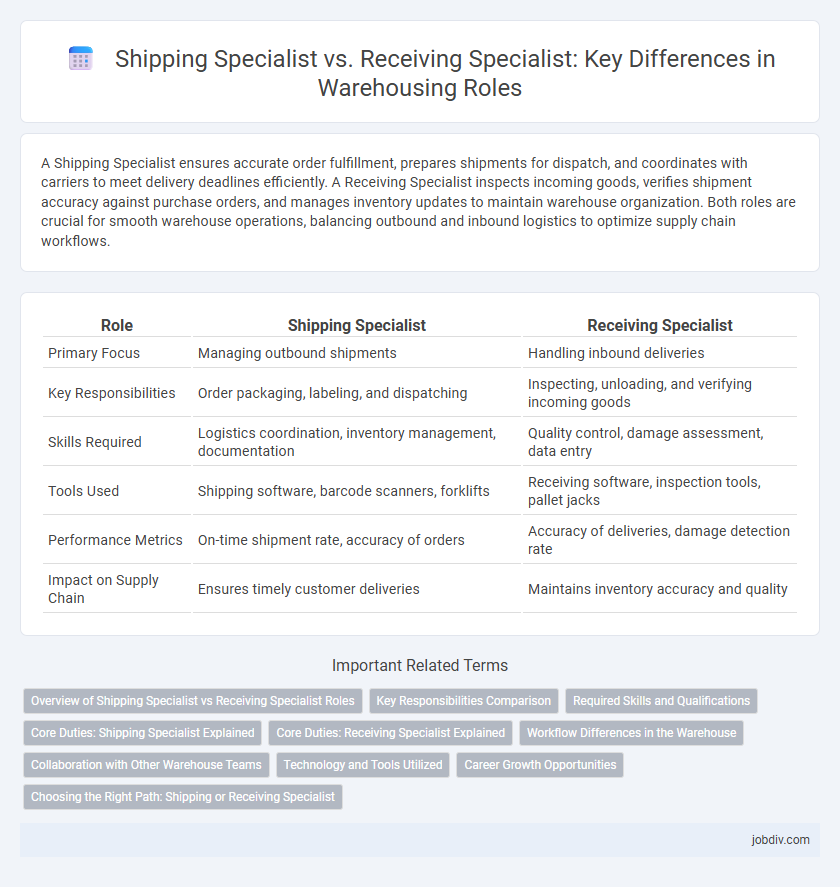A Shipping Specialist ensures accurate order fulfillment, prepares shipments for dispatch, and coordinates with carriers to meet delivery deadlines efficiently. A Receiving Specialist inspects incoming goods, verifies shipment accuracy against purchase orders, and manages inventory updates to maintain warehouse organization. Both roles are crucial for smooth warehouse operations, balancing outbound and inbound logistics to optimize supply chain workflows.
Table of Comparison
| Role | Shipping Specialist | Receiving Specialist |
|---|---|---|
| Primary Focus | Managing outbound shipments | Handling inbound deliveries |
| Key Responsibilities | Order packaging, labeling, and dispatching | Inspecting, unloading, and verifying incoming goods |
| Skills Required | Logistics coordination, inventory management, documentation | Quality control, damage assessment, data entry |
| Tools Used | Shipping software, barcode scanners, forklifts | Receiving software, inspection tools, pallet jacks |
| Performance Metrics | On-time shipment rate, accuracy of orders | Accuracy of deliveries, damage detection rate |
| Impact on Supply Chain | Ensures timely customer deliveries | Maintains inventory accuracy and quality |
Overview of Shipping Specialist vs Receiving Specialist Roles
Shipping specialists manage the outbound flow of goods, ensuring accurate packaging, labeling, and timely dispatch to meet delivery schedules. Receiving specialists focus on the inbound logistics, verifying shipment contents, inspecting for damages, and updating inventory records efficiently. Both roles are critical to maintaining warehouse operational accuracy and supply chain continuity.
Key Responsibilities Comparison
Shipping Specialists oversee order fulfillment by coordinating packing, labeling, and dispatching goods to ensure timely delivery and inventory accuracy. Receiving Specialists focus on inspecting, unloading, and verifying incoming shipments, maintaining precise stock records and reporting discrepancies. Both roles require strong attention to detail and effective communication to support warehouse operations and inventory control.
Required Skills and Qualifications
Shipping Specialists require expertise in inventory management, order processing, and proficiency with shipping software and barcode scanners to ensure accurate outbound logistics. Receiving Specialists must have strong skills in inspecting incoming goods, verifying purchase orders, and operating forklifts or pallet jacks to maintain efficient inbound inventory flow. Both roles demand attention to detail, physical stamina, and familiarity with safety regulations in warehouse operations.
Core Duties: Shipping Specialist Explained
Shipping specialists coordinate the preparation, packaging, and dispatching of goods to ensure timely delivery and accuracy in order fulfillment. They manage shipping documentation, track shipments, and communicate with carriers to resolve transportation issues. Proficiency in inventory systems and compliance with shipping regulations are essential for optimizing warehouse distribution processes.
Core Duties: Receiving Specialist Explained
A Receiving Specialist manages the accurate inspection, verification, and documentation of incoming shipments to ensure inventory integrity in warehousing operations. Their core duties include unloading goods, checking for damages, matching shipments against purchase orders, and updating inventory management systems in real-time. This role directly influences supply chain accuracy and efficiency by preventing discrepancies and facilitating smooth goods flow.
Workflow Differences in the Warehouse
Shipping specialists manage outbound logistics by preparing orders, packaging products, and coordinating carrier pickups to ensure timely delivery. Receiving specialists focus on inbound processes, inspecting incoming shipments, verifying quantities, and updating inventory records for accurate stock levels. Workflow differences revolve around outbound versus inbound priorities, with shipping specialists emphasizing dispatch efficiency and receiving specialists ensuring accurate data capture and quality control.
Collaboration with Other Warehouse Teams
Shipping Specialists coordinate closely with Inventory Management and Quality Control teams to ensure accurate order fulfillment and timely dispatch. Receiving Specialists collaborate with Procurement and Inspection units to verify incoming shipments and update stock records efficiently. Both roles rely on seamless communication and teamwork to optimize warehouse operations and maintain supply chain integrity.
Technology and Tools Utilized
Shipping Specialists leverage advanced transportation management systems (TMS) and barcode scanning technology to streamline order fulfillment and ensure accurate dispatching. Receiving Specialists emphasize the use of warehouse management systems (WMS), RFID scanners, and automated sorting equipment to efficiently track incoming shipments and maintain inventory accuracy. Both roles utilize handheld devices and real-time data analytics to enhance operational efficiency and reduce errors in the supply chain.
Career Growth Opportunities
Shipping Specialists often experience career growth through roles in logistics coordination, supply chain management, and operations supervision due to their expertise in outbound processes. Receiving Specialists can advance by specializing in inventory control, quality assurance, and warehouse management, leveraging their skills in inbound logistics and material handling. Both roles offer pathways to higher management positions within warehousing, with progression dependent on gaining cross-functional knowledge and leadership abilities.
Choosing the Right Path: Shipping or Receiving Specialist
Shipping Specialists optimize outbound logistics by coordinating order fulfillment, managing carrier relationships, and ensuring timely delivery to enhance customer satisfaction. Receiving Specialists focus on inspecting inbound shipments, verifying inventory accuracy, and organizing storage to maintain efficient warehouse operations. Choosing between these roles depends on whether you prefer dynamic dispatch coordination or meticulous inventory intake and quality control within warehousing.
Shipping Specialist vs Receiving Specialist Infographic

 jobdiv.com
jobdiv.com